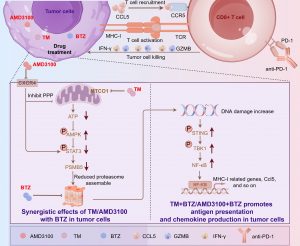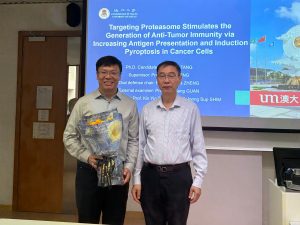A research team led by Chuxia Deng, chair professor in the Faculty of Health Sciences (FHS) at the University of Macau (UM), has made a breakthrough in cancer research. The study used drug combination screening to identify a novel strategy that enhances the efficacy of proteasome inhibitors against solid tumours. Furthermore, the findings demonstrate that this drug combination can effectively improve the therapeutic effect of immune checkpoint inhibitors against breast cancer, offering new hope for patients. The research has garnered significant attention in the biomedical field and has been published in the prestigious international journal Cell Reports Medicine.
Proteasome inhibitors are widely used in clinical practice to treat liquid tumours, such as multiple myeloma. Previous research by the UM research team on cisplatin resistance mechanisms in breast cancer showed that resistant cells evade chemotherapy-induced cell death by increasing their own proteasome activity to clear proteins damaged by the drugs. The team also discovered that combining proteasome inhibitors could effectively reverse multidrug resistance in tumours. However, although solid tumour cells are highly sensitive to proteasome inhibitors in vitro, these drugs are ineffective at inhibiting solid tumour growth in vivo.
To address this challenge, the research team developed a drug combination screening strategy to identify agents that could enhance the tumour-killing effect of bortezomib, a proteasome inhibitor. The screening identified two FDA-approved drugs, ammonium tetrathiomolybdate (TM) and plerixafor, which can sensitise breast cancer cells to bortezomib by modulating the AMPK/STAT3/PSMB5 signalling axis. Moreover, in breast cancer mouse models, the drug combination exhibited anti-tumour effects in a CD8+ T cell-dependent manner through the following mechanisms: 1) The drug combination induces tumour cells to produce and secrete CCL5, recruiting CD8+ T cells to the tumour site; 2) The drug combination activates the antigen processing and presentation pathway in tumour cells, leading to the activation of CD8+ T cells; and 3) The activated CD8+ T cells kill tumour cells and boost the anti-tumour immune response. This study holds significant clinical potential and provides a novel drug combination strategy for proteasome inhibitor-based therapy against solid tumours.
Prof Deng is the corresponding author of the study, and Tang Dongyang, a PhD student in FHS, is the first author. The following FHS members also contributed to the study: PhD students Lin Shiqi, Chu Xiangpeng, Li Ling, He Lin, and Qiao Yunfeng; postdoctoral fellows Josh Lei Haipeng and Zhou Jingbo; Research Assistant Professors Shao Fangyuan and Sun Heng; and Adjunct Associate Professor Xu Xiaoling. Members of the Animal Research Core and the Biological Imaging and Stem Cell Core in FHS also made significant contributions to the study. The research project was funded by the National Natural Science Foundation of China (File No.:82030094), the Science and Technology Development Fund of the Macao SAR (File No.: 0009/2022/AKP, 0004/2021/AKP, 0007/2021/AKP, 0092/2020/AMJ, and 0054/2023/RIA1), and the University of Macau (File No.: CPG2023-00031-FHS, MYRG2020-00076-FHS, MYRG2022-00181-FHS and MYRG-GRG2023-00029-FHS). The full version of the research article is available at https://www.cell.com/cell-reports-medicine/fulltext/S2666-3791(25)00284-8.
| Source: Faculty of Health Sciences | |
| Media Contact Information: | |
| Communications Office, University of Macau | |
| Albee Lei | Tel: (853) 8822 8004 |
| Bell Leong | Tel: (853) 8822 8009 |
| Email: | prs.media@um.edu.mo |



